
This section contains additional rules that players need to understand to play their first game.
Action Cards
Throughout the game, players will accumulate action cards. Players can use action cards to resolve powerful one-time abilities. Each player can have a maximum of seven action cards in his hand. If a player exceeds this number, he must choose which seven cards he wishes to keep and discard the rest.
Each action card indicates when it can be used at the top of its card. When an action card is used, the player using it reveals the card, resolves its effect, and discards the card.
If an action card begins with the word "Action", it can be used as a component action during a player's turn of the action phase.
Trade Goods and Commodities
trade goods are a universal currency that players will use to produce units or bribe other empires. A player may spend a trade good as either one resource or one influence.
Players may also accumulate commodities. A commodity represents a product that is plentiful within a player's empire. Commodities have no inherent value but become trade goods when given to another player. Both trade goods and commodities are represented by opposite sides of the same token, and exist in values of "1" or "3".
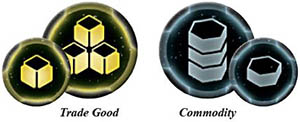
During the game, players may replenish commodities by using the abilities of the "Trade" strategy card. When a player replenishes commodities, he takes commodity tokens from the supply until he has a number of tokens equal to the commodities value on his faction sheet. A player cannot have more commodities than that printed value.
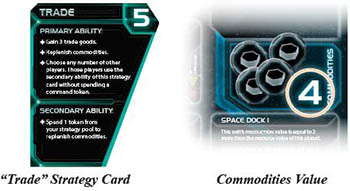
When a player gives another player a commodity, that commodity converts into a trade good; the player receiving the commodity flips the token to its trade good side. Players are encouraged to replenish commodities through the "Trade" strategy card and trade them to one another in mutually beneficial transactions.
Neighbors, Transactions, And Deals
As players move their ships about the galaxy and invade planets, they will undoubtedly come into contact with other players' empires. While this may often lead to war over planets and systems, it does not have to. Neighboring players can peacefully trade with each other.
If a player has a unit or controls a planet in a system that is adjacent to a system that contains a unit or planet that another player controls, those two players are neighbors.
During the active player's turn, he may negotiate a transaction with one or more of his neighbors, even during a combat. As part of a transaction, the negotiating players may exchange any number of trade goods and commodities.
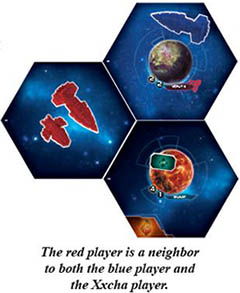
The active player may negotiate only once with each of his neighbors per turn. After a transaction has been finalized, no other transactions may occur between those players that turn.
Frequently, players will negotiate transactions that go beyond a simple exchange of goods. These transactions are called deals. For example, the active player might move his ships into a system that contains another player's PDS, at which point the active player might offer the owner of that PDS a trade good to refrain from using the "Space Cannon" ability.
Because the effect can be resolved immediately, this deal is a binding deal. When a deal is binding, a player must honor his end of the bargain. In the previous example, if the owner of the PDS agrees to this deal and takes the trade good, he cannot fire his PDS as this would violate their agreement.
Not all deals are binding, however. For example, a player might offer another player a trade good to attack a specific player during a later turn. Because the effect cannot be resolved immediately, this deal is a non-binding deal. The player who was given the trade good, despite the terms of the deal, is not required to honor his end of the bargain and may fulfill or ignore the deal as he chooses.
Technology
During the game, players will gain technology in the form of technology cards. Technologies provide players with powerful abilities and allow players to upgrade their units. Each player has an identical deck of technology cards that he may look through at any time, as well as a number of faction technology cards that he set aside during setup.
There are four basic colors of technology. A technology's color is indicated by a green, red, blue, or yellow symbol located on the lower-right corner of the card. Players use these symbols when researching technology.

Each player begins the game with a number of starting technologies as indicated on the back of his faction sheet. Additionally, a player can research new technologies from his deck during the game. A player places his starting technologies and any technology he researches faceup in his play area.
After a technology is faceup in a player's play area, that player owns that technology. A player's owned technologies remain in play for the duration of the game and their abilities can be used as described on the card.
Some technologies have the word "Action" in their card text; players can resolve these cards by using a component action during the action phase.
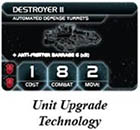
Some technologies are unit upgrade technologies. Unit upgrades technologies match a unit on a player's faction sheet. When a player gains a unit upgrade technology, he places its card over the corresponding unit on his faction sheet. The white arrows next to an attribute's value on the faction sheet indicate that the attribute will improve when its unit is upgraded.
When a unit is upgraded, all the player's units of that type, both on the game board and in his reinforcements, now have the attributes shown on the unit upgrade technology.
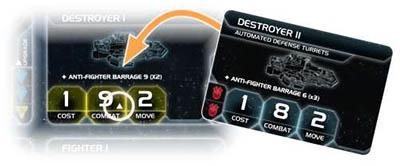
Researching Technology
Players gain new technology by researching it, usually by using the "Technology" strategy card. To research a technology, players must satisfy the prerequisites of the technology they wish to research. Prerequisites are printed as a column on the lower-left side of each technology card and contain one or more symbols that correspond to the four basic technology colors. Some technologies have no prerequisites and can be researched without owning any technology.
To satisfy a technology's prerequisites, a player must own a matching technology for each prerequisite symbol on the card he wishes to research. For example, a player that owns two red technologies may research the red technology "Duranium Armor", as it has two red prerequisites.
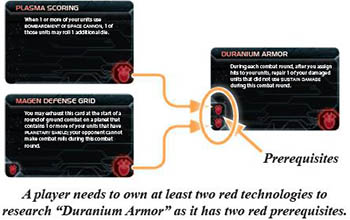
After the player researches the "Duranium Armor" technology, it satisfies another red prerequisite, as indicated on the lower-right corner of the card; the next time that player researches a technology, he may research a technology that has three red symbols as a prerequisite. Unit upgrade technologies, unlike other technologies, may have prerequisites composed of multiple colors. Additionally, unit upgrade technologies do not satisfy prerequisites when researching technology.
Technology Specialties
Lome planets provide the player with a technology specialty. Technology specialties are extremely valuable and help players research new technologies.
If a player controls a planet that has a technology specialty symbol, he may exhaust that planet when researching technology to ignore a prerequisite that matches that technology specialty. While researching technology, players may exhaust planets for their technology specialty or for their resources, but not for both.
Planet Traits
Most planets outside of home systems have a planet trait. There are three types of planets: cultural, hazardous, and industrial. Traits have no inherent game effect, but are referred to by some cards and abilities.

Unit Abilities
Many units in the game have unit abilities that appear as bulleted keywords on faction sheets and unit upgrade technology cards. The rules for these abilities are as follows:
Planetary Shield
If a unit has the "Planetary Shield" ability, the planet where that unit is located is not an eligible target for other units' "Bombardment" abilities.
Sustain Damage
If a unit has the "Sustain Damage" ability, it can become damaged to cancel one hit. A damaged unit is turned on its side but otherwise functions as it did previously.

A damaged unit cannot use "Sustain Damage" until it is repaired either during the status phase or by another game effect.
Production
A unit with the "Production" ability, such as a space dock, can produce new units. This ability is always followed by a value which dictates the maximum number of units that a unit that has this ability can produce.
Offensive Abilities
The following abilities require a player to roll dice to determine whether or not another player's units are hit: "Anti-Fighter Barrage", "Bombardment", and "Space Cannon".
These abilities are always followed by a number that determines the minimum die result required to produce a hit. For example, "Bombardment 5" indicates that the player rolls a single die, and if the result is five or greater, it produces one hit.
Some of these abilities are followed by a second number presented inside parentheses. This number indicates how many dice a player rolls.
For example, when a player uses an ability that reads "Space Cannon 5 (x3)", he rolls three dice and each die with a result of "5" or higher produces one hit. If an ability that requires a roll does not contain a number inside parentheses, a player only rolls one die.
Hits that are produced by abilities are assigned immediately. When a hit is produced against a player's units, he chooses and destroys one of his units.
Players use each of these abilities at different times and can hit different types of units as described below:
-
Anti-fighter barrage: A player uses this ability during the "Anti-Fighter Barrage" step of the first round of space combat. These hits can only be assigned to fighters.
-
Bombardment: A player uses this ability during the "Bombardment" step of an invasion. These hits can only be assigned by the bombarded player to ground forces on the planet being bombarded. If there are multiple planets in the system, the active player must choose which of his units in the system are bombarding which planets before rolling dice.
-
Space cannon: A player can use this ability at two different times, as follows:
After the "Movement" step of a tactical action, all players can use the "Space Cannon" abilities of their units that are in the active system. The player whose units the ability was used against must assign these hits to ships in that system.
During the "Space Cannon Defense" step of an invasion, the player who controls the planet being invaded can use the "Space Cannon" abilities of his units on that planet. The invading player must assign these hits to his ground forces that are invading the planet.
Continue Reading


